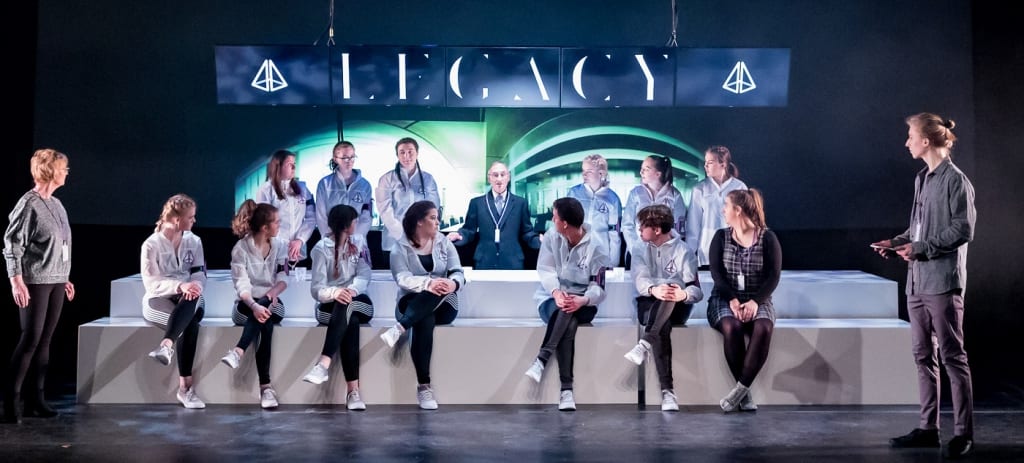The year is 2085. Philip Blackthorn’s (Ian Giles) tech enterprise, Legacy, has grown exponentially. Breeding its own race of children, Legacy manufactures their lives into “perfect” existences and sells their data to those who seek a flawless public image. With the ability to manufacture and manipulate a life, to permanently eradicate one’s indiscretions and to turn even the most twisted dreams into reality, Legacy is not simply a political powerhouse, but the rather, it is a puppet-master behind an individual’s perception of “the real”. When a boy’s body is found in a canal, however, accompanied by a young girl (Meg Watson) too shaken to reveal what happened to him, Detective Simone McDonald (Shirley Williams) is determined not to be deceived and to uncover the dark truth behind the smoke and mirrors of Legacy.
Technology is a staple of modern life, its use – and misuse – an increasingly relevant concern. The use, in this production, of an intergenerational cast (comprised of a youth theatre and actors over the age of sixty-five) is not only unique but commendable in uniting two generations so often perceived to be separated by the radical advances in technology in recent decades. Legacy offers an exciting premise, but, unfortunately, doesn’t manage to satisfyingly deliver its story and the ambitious themes that accompany it. The most immediate issue with the performance is volume – without microphones, the dialogue is frequently rendered inaudible. The injections of music, despite their potential to add impact to the chorus scenes, exacerbate this issue by overwhelming the monologues.

The performances are generally lacklustre. Several members of the cast stumble over their lines or rush to deliver their lines before their cues. Whilst these mistakes are small, they occur far too frequently, compounding the lack of immersion created by the poor audio. Furthermore, the lines that are audible are generally flat and monotonous. Only Adam Kane as web star Axis; Stan Gaskell as intimidating Legacy technician Huret; and the chorus, in their neatly choreographed and enthusiastically acted scenes, offer notable exceptions to the otherwise passive performances of the main cast. Lack of chemistry, in particular, becomes an unfortunate hallmark of the play, with none of the cast portraying convincing relationships. Whilst the separating effect of technology is certainly a relevant topic in Legacy, the superficiality with which the characters’ relationships are handled does not come across as deliberate.
Ultimately, the content is the crux of what makes Legacy underwhelming. Aside from Axis, whose ultra-relatable YouTube persona disguises his proclivity for violence, the characters are fundamentally one-dimensional. The superficiality with which the scenes are treated makes the play disjointed and jumpy; there is no sense of a wider picture. The “twist” at the end is sadly predictable and the climax is made even more underwhelming by the rushed pace. Even those scenes which feel less uninteresting or jarringly out of place lack any real sense of atmosphere, failing to transport the audience into Legacy’s world.
The crucial issues with volume, performance and content mean that the promising aspects of Legacy never get the chance to flourish. The themes are ambitious – perhaps too much so, for the nearly 120-minute production brings up all manner of concerns about the influence of technology and the wizards behind it without really honing in on any one in particular and giving it a truly rigorous examination. The flat performances and uninspired dialogue undermine the powerful punch the production aims to land. Lacking depth or compelling characters and featuring dialogue that, when audible, lacks impact, Legacy sadly squanders its potential to offer a thought-provoking meditation upon the tyranny of technology.

